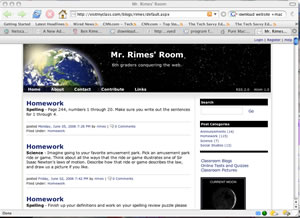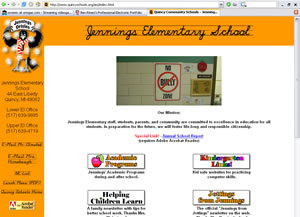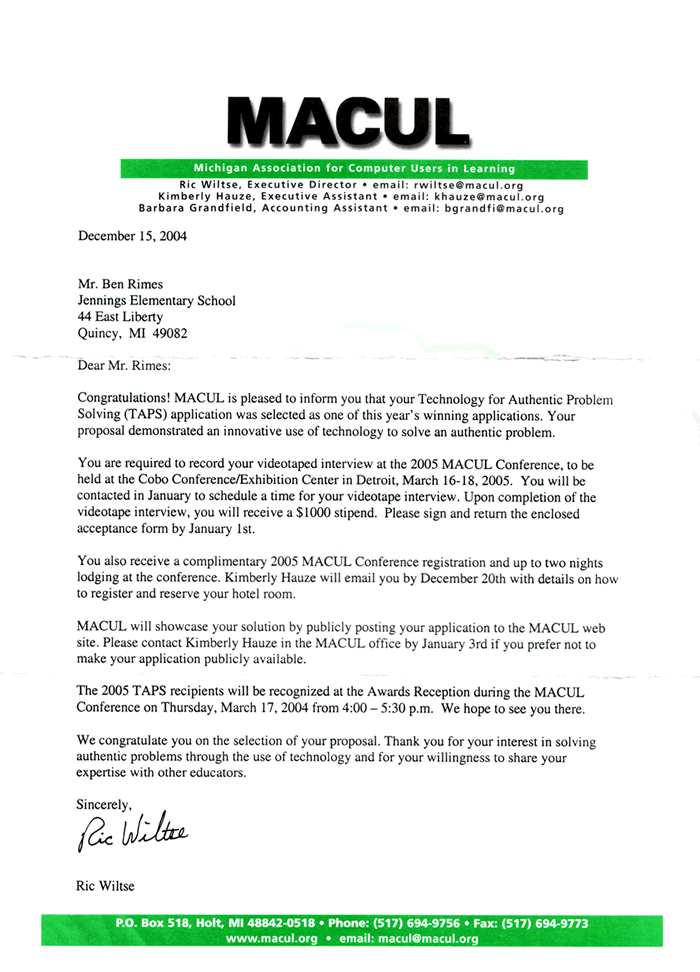 |
 |
 |
|
The schools, now more than ever, have a responsibility
to be a vital center for providing healthy models
of human interaction, extending community values,
and providing a secure environment for our children.
As a society, we will always face the unforeseen
challenges, decisions, and realizations of the
world. It is through school that we are able
to impart our collective knowledge to deal with
these challenges to the next generation. I feel
that by successfully modeling our society's
norms, values, and beliefs within the classroom
those we teach will be better able to maintain
and improve our society in the future. Just
as adults are prepared to cope with a number
of different and unique situations throughout
the work week, so must our children receive
diverse methods of instruction to better assimilate
the knowledge placed before them. Direct instruction,
collaborative learning, peer-tutoring, and directed
discovery are just a few of the many tools at
my disposal to help create a classroom of learners
able to accomplish the myriad of tasks set before
them not only during the school week, but throughout
their lives as well.
To quote Thomas Jefferson,
"A nation, as a society, forms a moral
person, and every member of it is personally
responsible for his society."
It is as a valued member of our society that
children will see the significance of their
education, and place the importance of lifelong
learning foremost among their personal goals.
So that I might encourage every student to be
responsible for their role in society their
civic efficacy will be encouraged through the
democratic virtues of responsibility, civility,
courageousness, fairness, honesty, and
lawfulness.
|
 |
|
 While teaching sixth grade I knew that maintaining effective communications with my students' parents would be very helpful. Getting word out about an upcoming field trip, what the daily homework assignments would be, and how to get in contact with me outside of school were all very important pieces of information to send home. Thankfully with the help of the Internet I was able to provide parents, and students with a blog containing all of our posted homework and other assignments, links to classroom resources, and give the students a safe portal for exploring the rest of the web. Through the blog I was able to comment with students, and post daily homework so parents could double check exactly what the assignments were each night, and what would be due the following day. Parents loved having the ability to check on homework without having to call me or rely on students' planners, which often don't make it home for the day. While teaching sixth grade I knew that maintaining effective communications with my students' parents would be very helpful. Getting word out about an upcoming field trip, what the daily homework assignments would be, and how to get in contact with me outside of school were all very important pieces of information to send home. Thankfully with the help of the Internet I was able to provide parents, and students with a blog containing all of our posted homework and other assignments, links to classroom resources, and give the students a safe portal for exploring the rest of the web. Through the blog I was able to comment with students, and post daily homework so parents could double check exactly what the assignments were each night, and what would be due the following day. Parents loved having the ability to check on homework without having to call me or rely on students' planners, which often don't make it home for the day.
The site was also useful for getting my students excited about a project and directing our learning. Posting questions that they could comment about online provided them with an excellent discussion tool, allowing them to go back and review what had already been said. They were also highly engaged whenever I provided links or other resources that they needed to study before leaving a comment. In this way we could track the progress of our learning and compare our most recent achievements, understandings, and ideas with the understandings and concepts we had before embarking on a particular unit or subject.
 Being my school's "technology savvy" teacher and a member of the Michigan Association for Computer Users in Learning, I was appointed to the position of webmaster for the Jennings Elementary School website.
The
website is a very helpful tool in providing
online resources for both students and their
parents, as well as providing a place to
post classroom notes, important school information, and show the community what's happening in our school with images from school wide events. Special links can be added for
students to enhance their learning at home,
or continue working on a particular concept
should they so desire. The school website
is just one of many technology tools with
which a teacher can work towards the goals
set forth by ISTE
(The International Society for Technology
in Education). Being my school's "technology savvy" teacher and a member of the Michigan Association for Computer Users in Learning, I was appointed to the position of webmaster for the Jennings Elementary School website.
The
website is a very helpful tool in providing
online resources for both students and their
parents, as well as providing a place to
post classroom notes, important school information, and show the community what's happening in our school with images from school wide events. Special links can be added for
students to enhance their learning at home,
or continue working on a particular concept
should they so desire. The school website
is just one of many technology tools with
which a teacher can work towards the goals
set forth by ISTE
(The International Society for Technology
in Education).
WebQuests
With
the use of inquiry-driven integrated lessons
throughout the school year it is possible
to teach the computer skills necessary
to utilize the internet and technology,
but also to give students a true purpose
to go online by connecting learning in the
classroom to the world wide web. WebQuests are the perfect example of inquiry-driven activities in which almost all of the resources are drawn from the web. Students are led through a series of handpicked websites by teacher, and are given small tasks to complete at each site. They may gather information, manipulate data, or piece together facts before attempting a much larger culminating task that the WebQuest centers around. Most WebQuests are built around productivity and processing tasks in which the learners must synthesize the information gathered in previous steps to produce a useful learning tool. WebQuests are highly versatile in that they can be used at various age levels and are easily adaptable to many curricular areas, providing ways for educators to integrate technology with the core content areas.
Two WebQuests that I have authored can be found below on the Jennings Elementary School website:
Famous Explorer Baseball Cards (Award winning WebQuest)
Fast Food Frenzy
|
|
 |
|
As
a technology using educator I am a standing member of the MACUL (Michigan
Association of Computer Users in Learning) professional organization. Founded in 1975, MACUL is one of the largest professional organizations in the Midwest that promotes the use of computers and technology in education. Its annual conference contains dozens of sessions presented by both Michigan and nationally recognized educators that focus on technology integration, examples of best technology practices, current trends in teaching with technology, and emerging thoughts and studies on how to best use technology in our nation's schools.
So that I might have a better understanding of how an organization such as MACUL is run, as well as help provide the MACUL board of Directors with the perspective of a young teacher who is a member of the "digital natives", I ran for a seat on the board in 2006. While not receiving enough votes to be placed on the board, the president elect appointed me to the MACUL Board of Directors to give the board a younger voice. As one of the youngest members on the board of 16 educators and technologists, I plan on using many new ideas surfacing from the Web 2.0 to help make MACUL even stronger.
As a promoter of technology in education, I was honored in 2004 by MACUL with the presentation of a TAPS Award (Technology for Authentic Problem Solving). Using the WebQuest format described above I created an integrated unit of study that utilized the internet, word processing software, and image editing software that covered Michigan benchmarks for Social Studies, Language Arts, and Technology.

(click
on the letter to view an enlarged image)
|
|
Return
to Top
|
|
|
 |
|